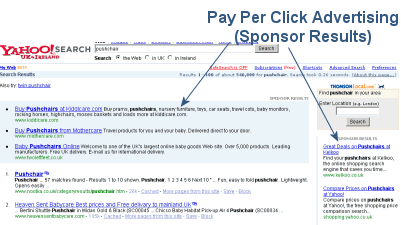Display advertising Interactive advertising Email marketing Web analytics Cost Per Action Revenue sharing Contextual advertising Search engine optimization Social media optimization
 Pay Per Click advertising Paid inclusion Pay per click (PPC) is an advertising model used on search engines, advertising networks, and content websites, where advertisers only pay when a user actually clicks on an ad to visit the advertiser's website. Advertisers bid on keywords they believe their target market would type in the search bar when they are looking for a product or service. When a user types a keyword query matching the advertiser's keyword list, or views a page with relevant content, the advertiser's ad may be shown. These ads are called a "Sponsored link" or "sponsored ads" and appear next to, and sometimes, above the natural or organic results on search engine results pages, or anywhere a webmaster chooses on a content page. Pay per click advertising is a search engine marketing technique.
Pay Per Click advertising Paid inclusion Pay per click (PPC) is an advertising model used on search engines, advertising networks, and content websites, where advertisers only pay when a user actually clicks on an ad to visit the advertiser's website. Advertisers bid on keywords they believe their target market would type in the search bar when they are looking for a product or service. When a user types a keyword query matching the advertiser's keyword list, or views a page with relevant content, the advertiser's ad may be shown. These ads are called a "Sponsored link" or "sponsored ads" and appear next to, and sometimes, above the natural or organic results on search engine results pages, or anywhere a webmaster chooses on a content page. Pay per click advertising is a search engine marketing technique.Pay per click ads may also appear on content network websites. In this case, ad networks such as Google Adsense and Yahoo! Publisher Network attempt to provide ads that are relevant to the content of the page where they appear, and no search function is involved.
While many companies exist in this space, Google AdWords, Yahoo! Search Marketing, and MSN adCenter are the largest network operators as of 2007. Depending on the search engine, minimum prices per click start at US$0.01 (up to US$0.50). Very popular search terms can cost much more on popular engines. Arguably this advertising model may be open to abuse through click fraud, although Google and other search engines have implemented automated systems to guard against this.
Categories
Advertisers using these bid on "keywords", which can be words or phrases, and can include product model numbers. When a user searches for a particular word or phrase, the list of advertiser links appears in order of the amount bid. Keywords, also referred to as search terms, are the very heart of pay per click advertising. The terms are guarded as highly valued trade secrets by the advertisers, and many firms offer software or services to help advertisers develop keyword strategies. Content Match, will distribute the keyword ad to the search engine's partner sites and/or publishers that have distribution agreements with the search engine company.
As of 2007, notable PPC Keyword search engines include: Google AdWords, Yahoo! Search Marketing, Microsoft adCenter, Ask, LookSmart, Miva, Kanoodle, Yandex and Baidu.
Keyword PPCs
"Product" engines let advertisers provide "feeds" of their product databases and when users search for a product, the links to the different advertisers for that particular product appear, giving more prominence to advertisers who pay more, but letting the user sort by price to see the lowest priced product and then click on it to buy. These engines are also called Product comparison engines or Price comparison engines.
Some Online Comparison Shopping engines such as Shopping.com use a PPC model and have a defined rate card.
Noteworthy PPC Product search engines include: Shopzilla, NexTag, and Shopping.com.
Online Comparison Shopping Engines
"Service" engines let advertisers provide feeds of their service databases and when users search for a service offering links to advertisers for that particular service appear, giving prominence to advertisers who pay more, but letting users sort their results by price or other methods. Some Product PPCs have expanded into the service space while other service engines operate in specific verticals.
Noteworthy PPC services include NexTag, SideStep, and TripAdvisor.
History
Internet marketing
Online advertising
Compensation methods
CTR - Click-through rate
CPM - Cost Per Mille
eCPM - Effective Cost Per Mille
CPT - Cost per thousand
CPI - Cost Per Impression
PPC - Pay per click
CPA - Cost Per Action
CPC - Cost Per Click
eCPA - effective Cost Per Action
Ad serving
Search engine marketing
Search engine optimization
No comments:
Post a Comment